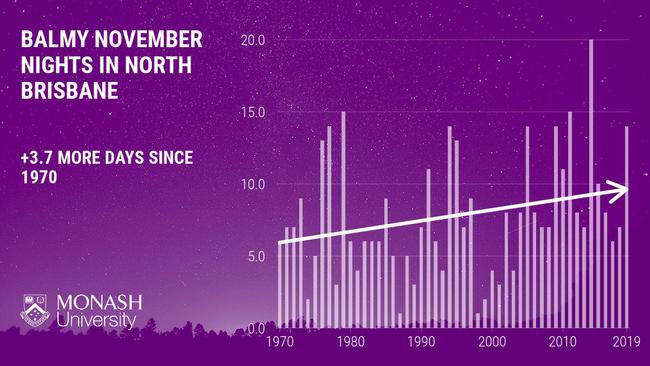More hot temperatures for the northern suburbs including North Lakes, Kedron and Gordon Park.
Dr Christa Pudmenzky discusses north Brisbane's forecast and warming night temperatures. Plus resident Stephen explains how hotter temperatures are affecting him.

HyperLocal
Don't miss out on the headlines from HyperLocal. Followed categories will be added to My News.
More sunshine is forecast for north Brisbane this weekend, reaching a top of 32 degrees on Sunday for this year's Brisbane Blast.
Light winds might bring some reprieve, but UV ratings will be high so be sure to slip slop slap.
Daytime temperatures are not the only things heating up this time of year.
Compared to 50 years ago, north Brisbane averages three more November nights reaching at least 20 degrees.
Back in 1970 there were six nights in November which reached 20 degrees, but last year there were 14.
Scientists say this significant increase in the average number of these balmy November nights is consistent with warming trends across southeast Queensland.
Did you know?
Across the world, nights are warming faster than days.
This shows that rising temperatures are not caused by changes in sun activity.
If warming was caused by an increase in the Sun's energy, we would see a faster rise in daytime temperatures, rather than night-time temperatures.
Warmer nights can affect the quality of our sleep, making it harder to fall asleep and stay asleep when temperatures are higher.
Voices from your community
During his two decades living in Mount Samson, Stephen is feeling the impacts of hotter temperatures.
"It's hotter and drier...I tend to do less in the summer months," he said.
"I now have to buy water (because we're) not getting enough rain to fill the water tanks for the past two years.
"Established trees in the garden are dying."
Community voices like Stephen's tell us how residents and business owners in Brisbane feel about their local climate. If you would like to contribute your voice to our column, you can fill out our 5-minute survey here.
Dr Christa Pudmenzky is a climate scientist at the University of Southern Queensland.
This column is part of a collaboration between Monash University and News Corp to deliver hyperlocal weather and climate information.
Questions? You can email us at mcccrh@monash.edu
